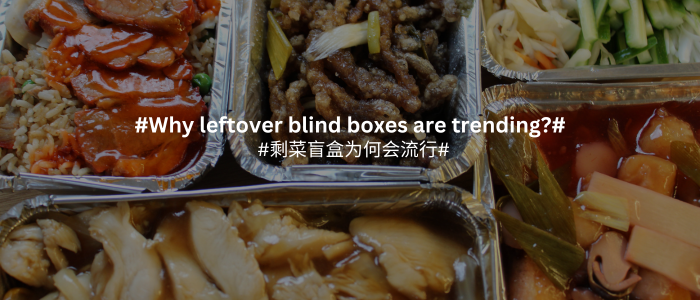Recently, a new trend of purchasing discounted unsold food in blind boxes, known as “leftover blind boxes (剩菜盲盒)” has taken off in China’s first-tier and new first-tier cities, particularly amongst young people. Consumers can enjoy 1/3 or even 1/4 of the regular price of a variety of food items such as sushi, coffee and bread amongst other things. This has stirred conversation on Chinese social media Weibo in terms of #Why leftover blind boxes are trending# (剩菜盲盒为何会流行) with over 3.5 million views in the 2nd week of June.
Beyond the hype: examining the factors behind the rise of “leftover blind boxes” in China
According to an ongoing poll launched by Sina hot spot (新浪热点) on Weibo as to why “leftover blind boxes” started trending in China, as of June 14th around 59% of the respondents chose “cheaper price” as the primary reason, since many young people are increasingly trying to cut their spending in order to save money. Around 27% believed it was because the blind boxes help reduce food waste, tapping into an increasing awareness of sustainability in China. In contrast, only 10% of the respondents considered the blind box marketing model as the main reason it has become popular.
Hygiene matters: netizens and bloggers highlight potential risks in “leftover blind boxes”

Source: Weibo, Chinese netizens shared their views
As its popularity shows no sign of slowing, there has been a growing concern about safety issues around this new concept. Some Weibo “Big V” bloggers are calling for more safety regulations on these products to protect consumers from potential risks of food poisoning and hygiene concerns associated with “leftovers.” “I don’t think it is an issue as long as the quality is guaranteed.” A netizen from Guangxi said.
Savings and sustainability: understanding the factors behind China’s “leftover blind boxes” trend
- “Leftover blind boxes” have become a popular trend in China, particularly among young people in major cities, offering significantly discounted unsold food items like sushi, coffee, and bread.
- According to a Weibo poll, the primary reasons behind the trend are the cheaper prices (59%) and the contribution to reducing food waste (27%), reflecting a desire to save money and growing sustainability awareness.
- Safety concerns have arisen regarding potential risks of food poisoning and hygiene associated with residual food, with calls from some Weibo bloggers for increased safety regulations, while others believe quality assurance is sufficient to address the concerns.
Read about young Chinese consumer trends






